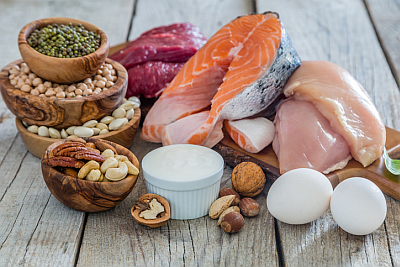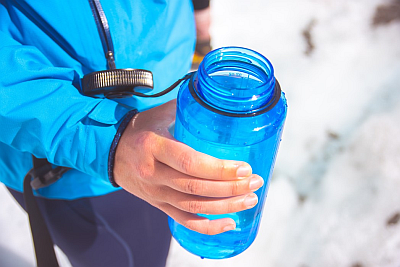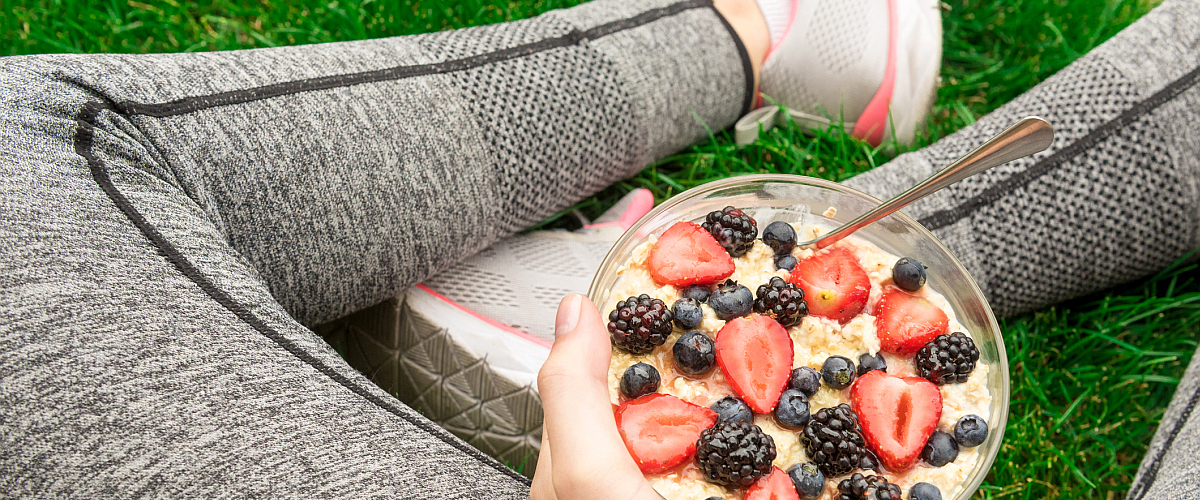Being a successful athlete requires more than hard work and training. It also requires maintaining a healthy diet and routine. And while there is no one-size-fits-all formula, you might be surprised to learn that the techniques the pros use to boost their performance can be just as useful for everyday athletes and weekend warriors. We checked in with Aramark dietitian Jillian Wanik, DCN, RDN, CSSD, an expert in sports nutrition, to find out how the right foods and drinks can help us win at active fun.
Q: What does it mean to eat a balanced diet and why is it important?
A: Think of your body as an engine. With the wrong blend of fuel, it won’t perform at max capacity. That’s why you need a balanced diet with the right blend of carb, protein, and fat – all key to maximizing your performance. Eating a variety of fruits and vegetables balanced with lean proteins, whole grains and dairy foods is a good start for most athletes.
Q: What are the best carbs to fuel muscles?
A: Carbs provide energy during exercise and replace stored energy after exercise, so it’s a good idea to include carbs in your meals and snacks. Some of the best options are whole grains including breads, cereals, crackers, pasta and brown rice. Fruit is another quick and easy carb source that can be eaten fresh, dried or canned in water. If you eat dairy, reach for milk, yogurt and cheese. And lastly, don’t forget vegetables and beans! They are also good carb sources.
Q: Which fats are considered healthy fats?
A: Healthy fats play an equally important role in fueling up right for performance. They give your muscles energy during exercise, particularly prolonged workouts, and help provide fat soluble vitamins including A, D, E, K and essential fatty acids (omega 3’s). Reach for healthy fat sources like canola oil, olive oil, nuts and nut butters, avocados, salmon, tuna, sunflower seeds, sesame seeds, and flax seeds.
Q: What are the best sources of protein? 
A: While protein typically does not provide fuel to muscles during exercise, it is the building block for muscle and key to strength building. Protein also promotes muscle growth and repairs muscle damage after exercise. Some well-known sources are lean cuts of meat or poultry, fish and eggs, and dairy foods like milk, yogurt and cheese. But don’t forget that plant-based sources like nuts, seeds, beans and soy work well in this category, too, and can actually take the lead as your main sources!
STAYING HYDRATED THE HEALTHY WAY
Q: How much fluid do we need and why is it important?
A: Hydration is key to performance. It’s important to replace the water you lose (which can at times be greater than a quart per hour!) when you sweat. But staying properly hydrated should begin before you work out and should continue during and after exercise, too. Did you know that by the time you are thirsty, you are already slightly dehydrated? Dehydration can make it harder to work out effectively and can create serious health risks. Aim to drink 2 to 3 cups of fluid for every pound lost during exercise.
Q: Can sports drinks help?
A: Sports drinks are most useful if you’re doing moderate to heavy exercise of more than one hour. Their carbohydrates and electrolytes can restore your reserves, but choose sport drinks with 80 calories or less from carbs in each 8 oz. Higher ratios can upset your stomach and slow absorption. Sports drinks are formulated for the proper mix of carbs and electrolytes, so don’t dilute them.
Q: When is water alone enough?
A: While there are hundreds of choices, one simple choice stands above the rest for healthy hydration: water! Make water your first choice for almost all workouts lasting less than one hour. You will get all the hydration with none of the calories.
Q: What should we eat or drink before exercise?
A: Pre-exercise nutrition is important. As you prep your body with an infusion of energy, remember carbohydrates are the primary muscle fuel for most types of exercise. Choose a carbohydrate-rich snack or meal that’s low in fat and fiber 3 to 4 hours before exercise to top off muscle stores. Including some protein is also good practice. And don’t forget to hydrate before you start to lose fluids!
Q: What should we take in after exercise?
A: After most light to moderate workouts, replace fluids with 2 to 3 cups of water and eat meals when you would usually. Sports drinks are not needed unless your workout was long or intense.
Q: How do we get more energy for a workout?
A: Carbohydrates and fats are the main fuel sources for energy during exercise. Generally speaking, carbohydrates should be 50% to 60% of most athletes’ calories and fats should be 20% to 35% of calories. Protein calories are primarily used to help build and repair muscle, not for energy, and should account for roughly 20% to 25% of your calories.
Note: Since everyone’s health history and nutritional needs are so different, please make sure that you talk with your doctor and a registered dietitian to get advice about the diet and exercise plan that‘s right for you.

